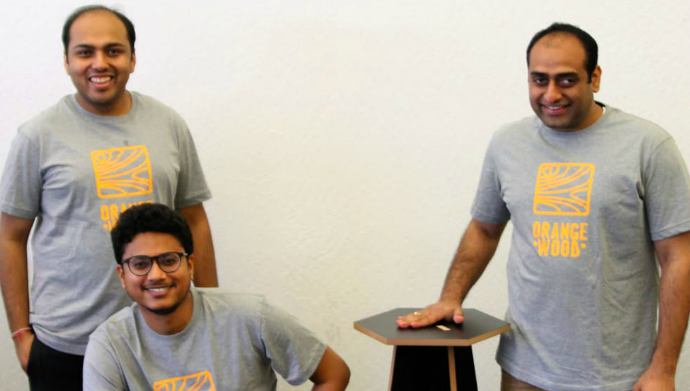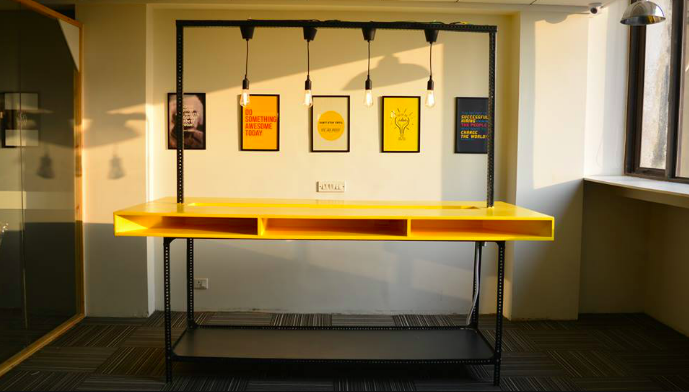Orangewood Labs was part of Y Combinator’s Winter 2018 batch

(L-R) Orangewood Co-founders Akash Bansal, Abhinav Das, and Aditya Bhatia
(Editor’s Note: Here’s an article from our archives which we feel is still relevant)
Aditya Bhatia, an alumnus of National Institute of Design (Ahmedabad), used to work as a furniture designer in Delhi, but was wasn’t happy with the way the whole industry functioned. He realised that most of the custom pieces being designed and created at traditional design studios would take two to three months to finish and it also involved a lot of manual labour.
Bhatia was determined to rewrite the whole concept, and knew that new-age technologies could be leveraged to bring in a change. He went to his friends Abhinav Das and Akash Bansal, both have prior startup building experience, and brainstormed.
“We started thinking of making the whole process better and thought of making a smart CNC (computer numerical control) router which can cut pieces of wood very fast and very precisely,” Das shares the story with e27. “This ended up in the founding of Orangewood Labs.”
Established in late 2017, Noida (near Delhi)- and Delaware (US)-based Orangewood is a design-led startup that creates customised furniture on demand, using robotics. The company, which follows a zero-inventory model, says it can make furniture within a few days of receiving the order from the client and can ship it the same day. Once it starts full fledged operations, this could be reduced to just a few hours, claims the founders.
Orangewood’s robots are cheaper, light-weight, and easier to deploy. Since these robots are connected to the internet, it is easy to run applications on the cloud and operate remotely.
“With the ability to create custom furniture on demand, we can quickly help you get that unique look that sets you apart from the rest,” Das claims. “Using robots for crafting the furniture pieces gives a millimetre level accuracy. We have a virtually limitless supply of fresh designs from designers all over the world.”
Most of Orangewood’s customers are enterprises, which are in need of custom furniture but don’t want to wait two to three months getting it done. The startup is also working with several co-working spaces in India to design furniture for them. “As of now, we follow a services model, where the customer pays a monthly or per product fee,” says Das, who is the CEO of the startup.
Orangewood targets businesses in the countries like the US, the Middle East and India.
The tech venture was part of Y Combinator’s (YC) Winter 2018 batch. The YC experience was very rewarding, adds Das, since the trio got an opportunity to meet in person most high-profile entrepreneurs they follow and admire.
“But getting into YC is really hard, with the number of applications increasing every year (the Winter 2019 has 10,000 applications). Thankfully, we got into it. We learnt lots of things from YC partners,” he says.
Das, who holds a Mechanical and Automation Engineering Degree from Guru Govind Singh Indraprastha University (Delhi) is not new to the startup world. In 2009, he founded a startup called Evomo, which built rural utility vehicles. The startup, however, ceased operations in 2015.

“But the whole experience of building ultra low-cost trucks helped me build better machines, and it came in handy when we started Orangewood,” he smiles. “Overall, startups are an evolving science and when you build things that have not been built before, you should know where to fail. We are making less mistakes since we have the experience of failing in the previous venture.”
Talking about the robotics industry in Asia, Das says that robots are not as popular as they should be in the industry at large. Just like computers in the 60’s, robots are expensive and still require trained professionals to handle them.
“Asia is doing as good as some of the developed nations when it comes to robotics, with China leading. India is slow in terms of adoption and its is still expensive to deploy and use robots here. Most SMEs are aware that they would become obsolete if they don’t move towards more automation. But access to capital for most SMEs in India is still a problem,” he adds. “We want to change that, starting with furniture industry. Having said that, India is a very good test bed and it’s now easier for us to develop technology here.”
Also Read: A novel approach to onboarding
Finding experienced hardware talent in India is hard, admits Das. “However, we have been quite lucky to have an awesome team which is not afraid to push the boundaries. Most of our team members are fresh graduates and are happy to learn new skills as we grow.”
In addition to YC, a few funds and angels have also invested in Orangewood, and the startup would be raising the next round soon.
“Its been a roller coaster ride till now, the very thought that your creations will have a huge impact on how humanity functions is awesome,” he concludes.
The post This robotic startup can make custom furniture on demand within few hours of getting your order appeared first on e27.